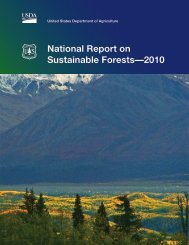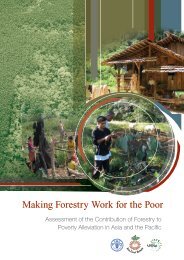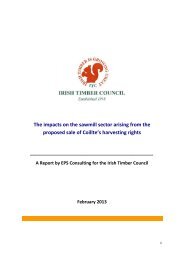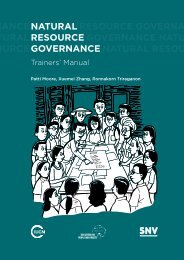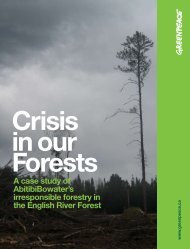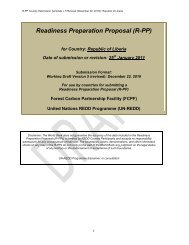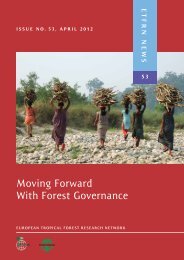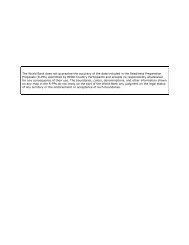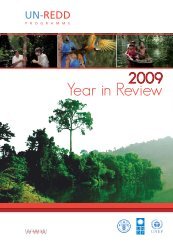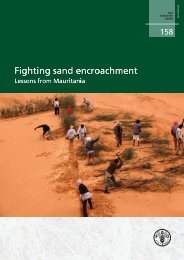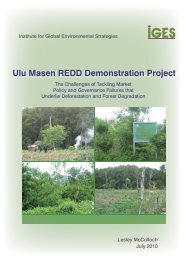pdf 1242 KByte - JIKO
pdf 1242 KByte - JIKO
pdf 1242 KByte - JIKO
You also want an ePaper? Increase the reach of your titles
YUMPU automatically turns print PDFs into web optimized ePapers that Google loves.
Policy Paper: Assessing prerequisites for market-based REDD+ activities 20<br />
solving policy-sensitive topics. The R-PP formulation process also showed that countries are making important<br />
experiences in how to best integrate stakeholders into decision making. With regard to the future<br />
implementation of REDD+, experiences indicate that knowledge in managing forest resources at the local<br />
level needs to be better reconciled with the ideas on REDD+ policy frameworks and incentive programmes<br />
at the national level. While the evaluation is mainly focusing on the formulation process of the R-PPs, the<br />
study also highlights the fact that the quality of the R-PPs has improved progressively over time, inter alia<br />
through increasing demands in the R-PP formulation templates provided by the FCPF (Baastel / Nordeco<br />
2011).<br />
Valuable insights can also be gained through reviews by institutions such as the World Resources Institute<br />
(WRI), which is regularly reviewing the R-PPs submitted to the FCPF in order to assess the extent to which<br />
governance issues have been addressed. In their findings, the authors indicate that countries are addressing<br />
an increasing number of governance aspects in their R-PPs. While often concrete steps on how to further<br />
proceed are proposed information and plans provided are currently not sufficient to achieve REDD+ readiness,<br />
according to the review. Particularly land tenure and stakeholder engagement represent issues that need<br />
additional consideration (Goers Williams et al. 2011).<br />
With a view to social and environmental aspects, these shortcomings are also reflected by a study conducted<br />
by FERN and the Forest Peoples Programme. According to their assessment, most R-PPs prepared by FCPF<br />
partner countries lack adequate plans for policy and legal reforms to ensure forest dependent people’s rights<br />
and improve forest governance. Accordingly, existing weaknesses in national legal frameworks are not considered<br />
appropriately, particularly regarding customary rights (Dooley et al. 2011).<br />
These experiences from the first years of the Readiness Fund have been reflected by the FCPF, which is<br />
regularly improving the R-PP template to address these and other shortcomings. With the aim to improve the<br />
respecting of safeguards, in its last amendment of the R-PP template the FCPF approved the “Common Approach<br />
to Environmental and Social Safeguards for Multiple Delivery Partners” that constitutes an overarching<br />
framework for risk assessment in the REDD+ readiness preparation process. It requests countries to implement<br />
four guidelines established by the FCPF, inter alia through the implementation of a Strategic Environmental<br />
and Social Assessment (SESA), by establishing a Environmental and Social Management Framework<br />
(ESFM) and by respecting the FCPF Guidelines on Stakeholder Engagement in the REDD+ Readiness<br />
process (FCPF 2011b).<br />
While setting of guidelines is therefore still under progress, the FCPF is progressing at high pace and with<br />
DRC, Nepal and Indonesia three countries signed the readiness preparation grant to receive support in implementing<br />
the activities proposed in their R-PPs. Furthermore, the Carbon Fund, which is meant to provide<br />
performance-based payments to REDD+ countries once readiness has been achieved, became fully operational<br />
in May 2011. However, the FCPF has still to develop the criteria for assessing if countries are actually<br />
ready for receiving performance-based payments. Establishing these criteria will prove challenging in the<br />
light of the diversity of REDD+ countries and their individual circumstances.<br />
3.2.6 LEEE implications<br />
A functional institutional structure will be pivotal for the efficient and effective implementation of REDD+<br />
activities on the ground. When assigning the coordination REDD+ to a task group, the aim of integrating a<br />
maximum number of relevant ministries has to be reconciled with the aim of having an efficient decision<br />
making process that can maximize REDD+ effectiveness through early action. The support and involvement<br />
Nicolas Kreibich, Christof Arens and Wolfgang Sterk<br />
Wuppertal Institute




